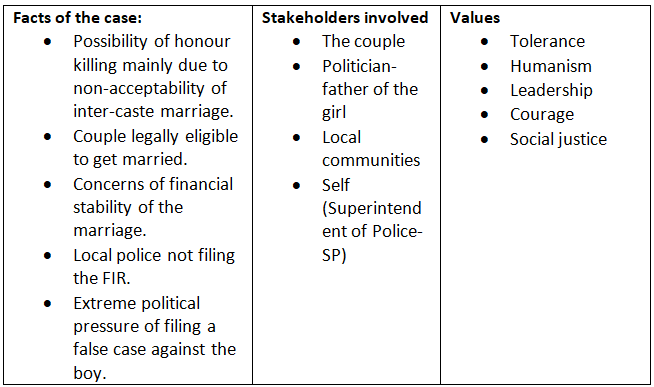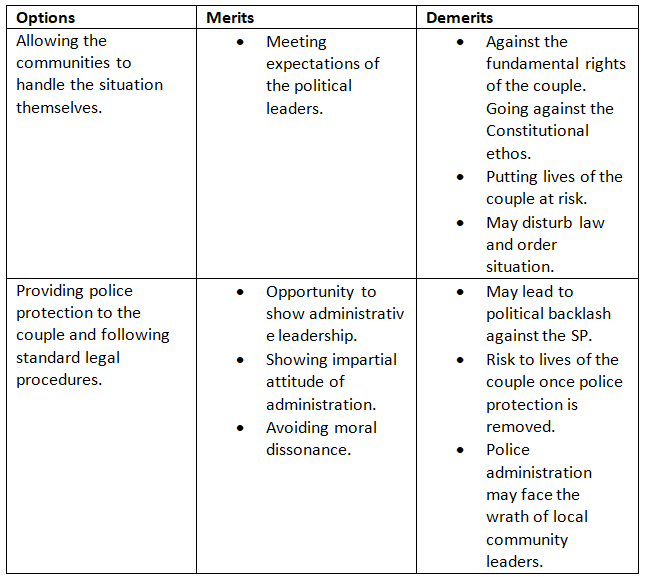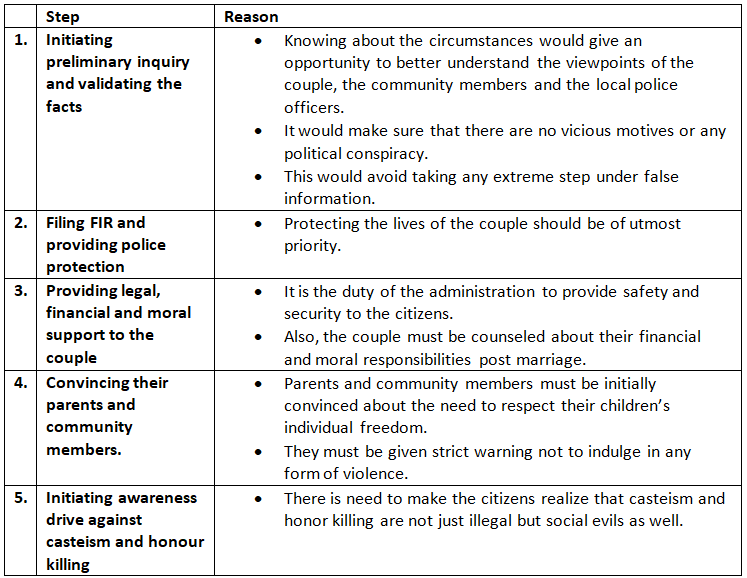Case Study: Norms | UPSC Mains: Ethics, Integrity & Aptitude PDF Download
Q: You are the Superintendent of Police (SP) in the district where instances of honour killing are rampant. One day you receive a phone call from a girl informing you of the potential threat to her and her partners’ life from her family as she has decided to marry a boy belonging to a lower caste. Moreover, the local police station is not filing the FIR or granting them protection. You ask her to visit your office but she demands police protection to come out from the hideout as her father’s goons are chasing her.
On further inquiry, you come to know that the girl is the daughter of one of the most powerful Minister of the State and both girl and boy are legally eligible to get married. The family is concerned about the family prestige due to the lower caste of the boy and also of the financial stability of marriage as they both are unemployed. You are under extreme political pressure to charge the boy of kidnapping the girl or else face the consequences.
In such circumstances, point out the ethical dilemma faced by you and options available to you. Also, chalk out the course of action you would prefer to follow. (250 words)
Ans: 
Ethical dilemmas
- Personal vs. Professional Ethics: Balancing the personal decision of adhering to political leaders' demands by withholding protection for a couple against the professional duty to uphold legal responsibilities and ensure their safety.
- Social Norms vs. Ethical Norms: Reconciling the societal disapproval of inter-caste marriages with ethical principles that support the couple’s right to exercise their free will.
Options available

Option (2) should be the correct approach to handle the situation.
Course of action

 |
Download the notes
Case Study: Norms
|
Download as PDF |
Measures to deal with the crisis
- Promoting Attitudinal Change: Implement steps to foster attitudinal change aimed at reducing caste prejudices, eradicating untouchability, and promoting the values of liberty, equality, and fraternity in society.
- Dr. Ambedkar Scheme for Social Integration: Utilize the Dr. Ambedkar scheme to encourage inter-caste marriages by providing financial incentives to couples to help them settle during the initial phase of their married life.
- Role of the SP: The SP must demonstrate a strong commitment to justice and service by ensuring the couple’s safety and fostering a secure environment in the district, free from the fear of moral policing.
- Confidence Building Measures: Undertake measures to rebuild public trust in the administration.
Challenging False Notions of Honour and Pride: Address deeply ingrained beliefs in honour and pride that often overshadow familial love and emotional bonds. Attitudinal change initiatives should focus on reviving social connections and fostering respect for human life and compassion.
|
78 videos|100 docs
|
FAQs on Case Study: Norms - UPSC Mains: Ethics, Integrity & Aptitude
| 1. What are the key features of the UPSC exam structure? |  |
| 2. How should candidates prepare for the UPSC exam effectively? |  |
| 3. What subjects are included in the UPSC Mains Examination? |  |
| 4. How important are current affairs for the UPSC exam? |  |
| 5. What role does the Personality Test play in the UPSC selection process? |  |






















